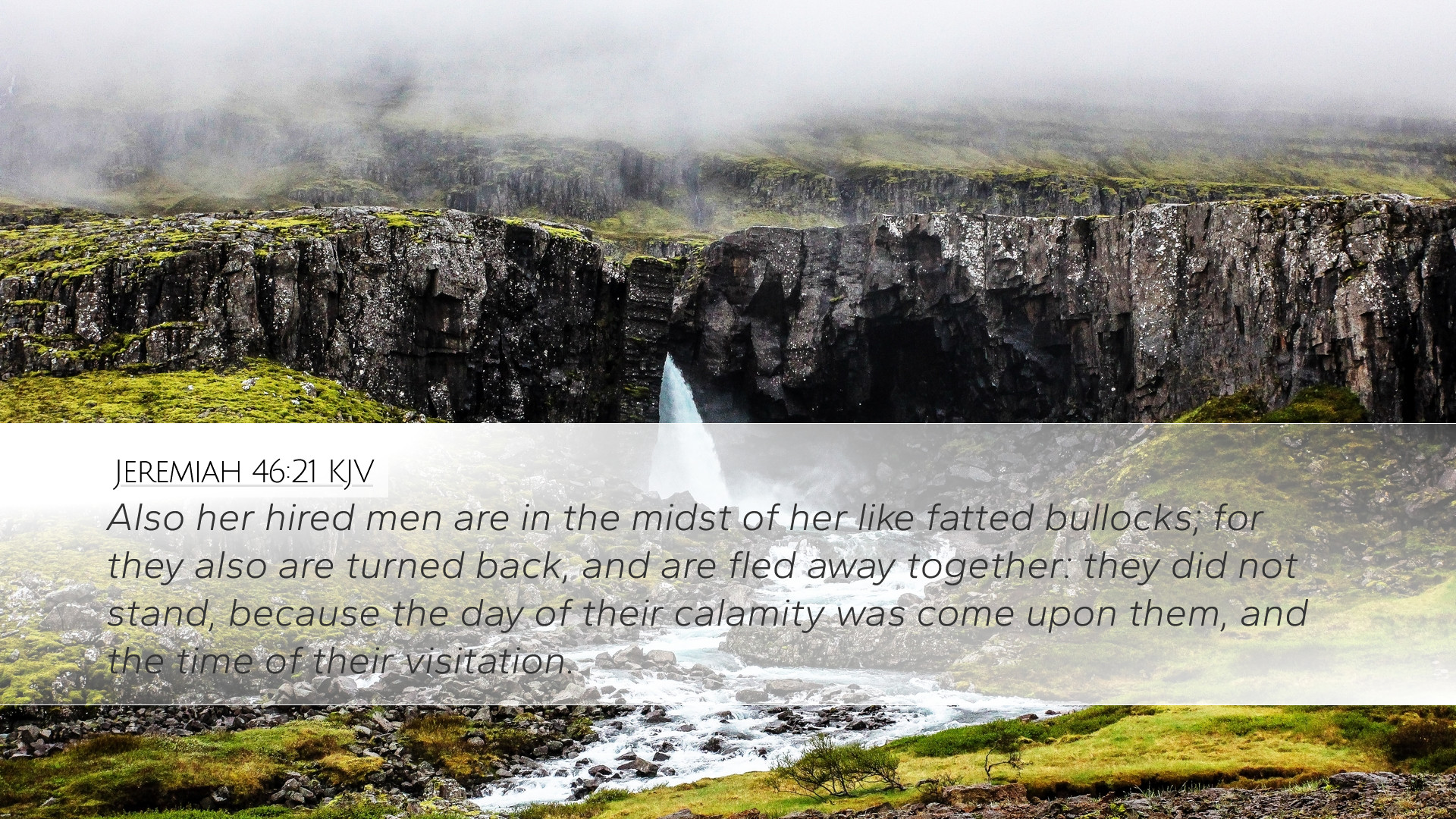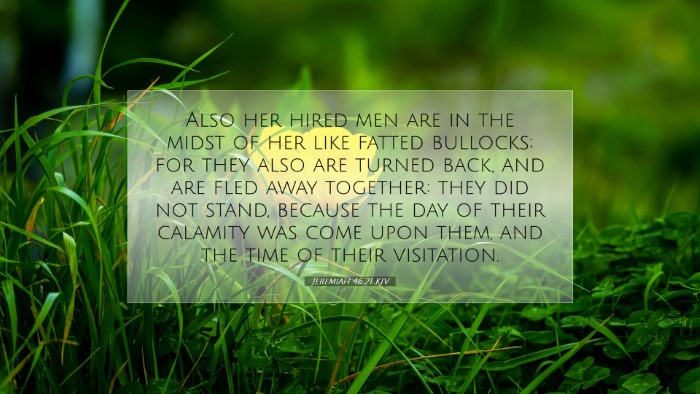Commentary on Jeremiah 46:21
Verse: "For even her hired men are in the midst of her like fatted bullocks; for they also are turned back, and are fled away together: they did not stand, because the day of their calamity was come upon them, and the time of their visitation." (Jeremiah 46:21, KJV)
Introduction
This verse is part of Jeremiah's prophecy concerning Egypt and serves as a sobering reminder of the consequences faced by those who oppose the divine will. The imagery used here paints a vivid picture of a once confident and robust defending force now reduced to chaos and disorder. This commentary synthesizes insights from renowned public domain commentaries, providing theological reflection that is valuable for pastors, students, theologians, and Bible scholars.
Contextual Background
The book of Jeremiah contains prophecies warning Judah and surrounding nations of impending judgment due to their sins. Chapter 46 specifically addresses Egypt in anticipation of its defeat by the Babylonians. Understanding this context is crucial, as it amplifies the weight of God's message of judgment.
The Nature of Egyptian Forces
Matthew Henry notes that "her hired men are like fatted bullocks," a metaphor illustrating their previous strength and readiness for battle. They were well-fed, prepared warriors; however, their overconfidence and reliance on worldly power led to their downfall. This symbolizes the futility of trusting in military might without divine support.
Albert Barnes elaborates further on this metaphor, indicating that the "hired men," unlike bulls that do not flee when the danger arises, represent men who were accustomed to their station and did not foresee their imminent peril. This weakness in human reliance stands firm in biblical narratives, suggesting God’s sovereignty over human affairs.
The Turning Back of the Warriors
Adam Clarke comments that the mention of the soldiers fleeing signifies moral and spiritual failure. It reveals a broader theological truth: when calamity approaches, those who place their trust in anything other than the Lord will face fear and retreat. This echoes the sentiment found throughout scripture, where the call for reliance on God is paramount.
The context of "the day of their calamity" highlights a crucial aspect of biblical prophecy: divine timing. Matthew Henry asserts that the phrasing indicates that their destruction was not merely a coincidence but rather the appointed time determined by God. It echoes a theme seen throughout the prophetic literature regarding God’s ultimate control over the fate of nations.
Moral Reflection
In applying the teachings from Jeremiah 46:21, the flight of these warriors serves as a moral reflection on the nature of faith in times of crisis. The passage raises several important questions: Are we prepared to stand firm in our faith when calamity strikes? Do we recognize the futility of our human efforts in the face of divine judgment?
Albert Barnes emphasizes that believers should take heed lest they also be swept away by the tide of tumult and danger, identifying the need for spiritual vigilance. Instead of falling back in fear, a call to trust in God’s providential care stands as a vital principle for Christians facing adversities.
The Time of Visitation
The phrase "the time of their visitation" carries significant theological weight. This term, as noted by Adam Clarke, can refer to God’s judgment or blessing. In this context, it starkly points to judgment—God's active intervention in human affairs as a response to sinful behavior. We see the profound lesson here that divine omnipotence will not be mocked; nations and individuals alike will face consequences for their actions.
This impending judgment holds wider implications. For pastors and theologians, it serves as a crucial reminder of God’s righteousness and the serious consequences of national and personal sin. Matthew Henry reinforces that God is not only a God of love but equally a God of justice who will not allow injustice to go unpunished.
Conclusion
Jeremiah 46:21 offers deep insights into the themes of judgment, the fragility of human strength, and the importance of reliance upon God. For contemporary application, this verse presents a striking commentary on the state of spiritual readiness in believers today. As we reflect on the consequences faced by the Egyptians as portrayed in this passage, it encourages a renewed call to vigilance, faith, and reliance on God's eternal power, especially in tumultuous times.
Key Takeaways
- The imagery of "fatted bullocks" illustrates both past strength and imminent weakness.
- Divine timing and intervention are central themes, highlighting God's sovereignty in judgment.
- The importance of spiritual readiness and reliance on God is paramount in the face of calamity.
- Visitation speaks to God's active role in judging sin, calling us to accountability.
- Contemporary believers are called to remain steadfast in faith amidst challenges.


